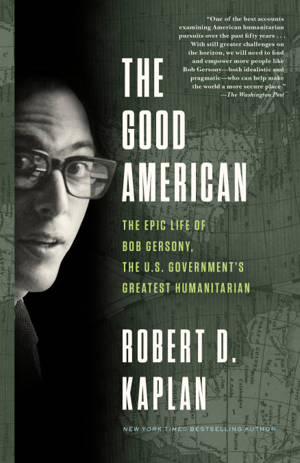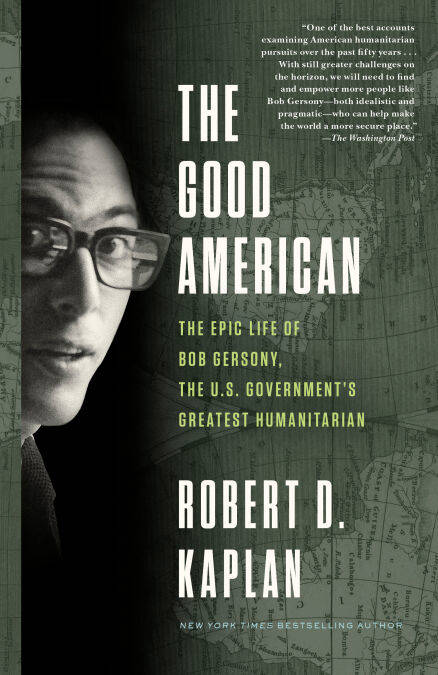
Bedankt voor het vertrouwen het afgelopen jaar! Om jou te bedanken bieden we GRATIS verzending (in België) aan op alles gedurende de hele maand januari.
- Afhalen na 1 uur in een winkel met voorraad
- In januari gratis thuislevering in België
- Ruim aanbod met 7 miljoen producten
Bedankt voor het vertrouwen het afgelopen jaar! Om jou te bedanken bieden we GRATIS verzending (in België) aan op alles gedurende de hele maand januari.
- Afhalen na 1 uur in een winkel met voorraad
- In januari gratis thuislevering in België
- Ruim aanbod met 7 miljoen producten
Zoeken
The Good American E-BOOK
The Epic Life of Bob Gersony, the U.S. Government's Greatest Humanitarian
Robert D. Kaplan
E-book | Engels
€ 13,88
+ 13 punten
Omschrijving
From the New York Times bestselling author of The Revenge of Geography comes a sweeping yet intimate story of the most influential humanitarian you’ve never heard of—Bob Gersony, who spent four decades in crisis zones around the world.
“One of the best accounts examining American humanitarian pursuits over the past fifty years . . . With still greater challenges on the horizon, we will need to find and empower more people like Bob Gersony—both idealistic and pragmatic—who can help make the world a more secure place.”—The Washington Post
In his long career as an acclaimed journalist covering the “hot” moments of the Cold War and its aftermath, bestselling author Robert D. Kaplan often found himself crossing paths with Bob Gersony, a consultant for the U.S. State Department whose quiet dedication and consequential work made a deep impression on Kaplan.
Gersony, a high school dropout later awarded a Bronze Star for his service in Vietnam, conducted on-the-ground research for the U.S. government in virtually every war and natural-disaster zone in the world. In Thailand, Central and South America, Sudan, Chad, Mozambique, Rwanda, Gaza, Bosnia, North Korea, Iraq, and beyond, Gersony never flinched from entering dangerous areas that diplomats could not reach, sometimes risking his own life. Gersony’s behind-the scenes fact-finding, which included interviews with hundreds of refugees and displaced persons from each war zone and natural-disaster area, often challenged the assumptions and received wisdom of the powers that be, on both the left and the right. In nearly every case, his advice and recommendations made American policy at once smarter and more humane—often dramatically so.
In Gersony, Kaplan saw a powerful example of how American diplomacy should be conducted. In a work that exhibits Kaplan’s signature talent for combining travel and geography with sharp political analysis, The Good American tells Gersony’s powerful life story. Set during the State Department’s golden age, this is a story about the loneliness, sweat, and tears and the genuine courage that characterized Gersony’s work in far-flung places. It is also a celebration of ground-level reporting: a page-turning demonstration, by one of our finest geopolitical thinkers, of how getting an up-close, worm’s-eye view of crises and applying sound reason can elicit world-changing results.
“One of the best accounts examining American humanitarian pursuits over the past fifty years . . . With still greater challenges on the horizon, we will need to find and empower more people like Bob Gersony—both idealistic and pragmatic—who can help make the world a more secure place.”—The Washington Post
In his long career as an acclaimed journalist covering the “hot” moments of the Cold War and its aftermath, bestselling author Robert D. Kaplan often found himself crossing paths with Bob Gersony, a consultant for the U.S. State Department whose quiet dedication and consequential work made a deep impression on Kaplan.
Gersony, a high school dropout later awarded a Bronze Star for his service in Vietnam, conducted on-the-ground research for the U.S. government in virtually every war and natural-disaster zone in the world. In Thailand, Central and South America, Sudan, Chad, Mozambique, Rwanda, Gaza, Bosnia, North Korea, Iraq, and beyond, Gersony never flinched from entering dangerous areas that diplomats could not reach, sometimes risking his own life. Gersony’s behind-the scenes fact-finding, which included interviews with hundreds of refugees and displaced persons from each war zone and natural-disaster area, often challenged the assumptions and received wisdom of the powers that be, on both the left and the right. In nearly every case, his advice and recommendations made American policy at once smarter and more humane—often dramatically so.
In Gersony, Kaplan saw a powerful example of how American diplomacy should be conducted. In a work that exhibits Kaplan’s signature talent for combining travel and geography with sharp political analysis, The Good American tells Gersony’s powerful life story. Set during the State Department’s golden age, this is a story about the loneliness, sweat, and tears and the genuine courage that characterized Gersony’s work in far-flung places. It is also a celebration of ground-level reporting: a page-turning demonstration, by one of our finest geopolitical thinkers, of how getting an up-close, worm’s-eye view of crises and applying sound reason can elicit world-changing results.
Specificaties
Betrokkenen
- Auteur(s):
- Uitgeverij:
Inhoud
- Aantal bladzijden:
- 544
- Taal:
- Engels
Eigenschappen
- Productcode (EAN):
- 9780525512325
- Verschijningsdatum:
- 25/01/2021
- Uitvoering:
- E-book
- Beveiligd met:
- Adobe DRM
- Formaat:
- ePub

Alleen bij Standaard Boekhandel
+ 13 punten op je klantenkaart van Standaard Boekhandel
Beoordelingen
We publiceren alleen reviews die voldoen aan de voorwaarden voor reviews. Bekijk onze voorwaarden voor reviews.









